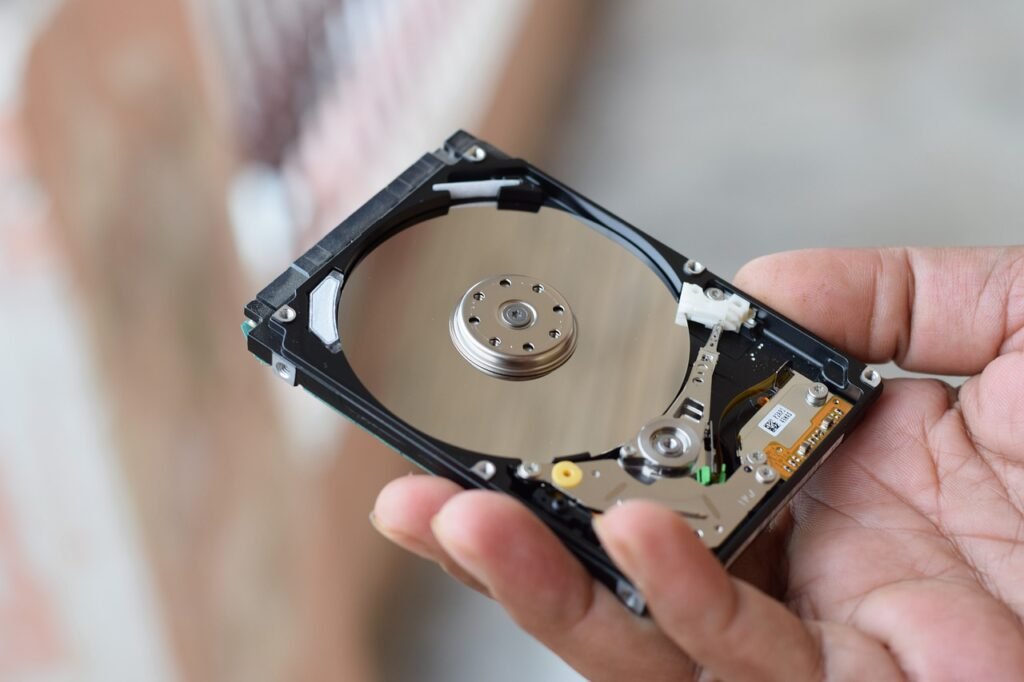Laptops have become an integral part of our lives, catering to our every need from work to entertainment. But have you ever wondered what goes on inside these portable powerhouses? The choice between a Solid State Drive (SSD) and a Hard Disk Drive (HDD) is a crucial decision when it comes to laptop storage. In this article, we will delve into a comprehensive comparison of SSD vs. HDD for laptops, exploring their differences, benefits, and drawbacks. So, whether you’re a tech enthusiast or simply in the market for a new laptop, sit back and let’s explore the world of laptop storage together!

This image is property of pixabay.com.
Capacity
SSD
Solid State Drives (SSDs) typically offer a wide range of storage capacities, from as little as 128GB all the way up to a massive 4TB. With the advancement of technology, SSDs are constantly increasing their capacity, making it easier for you to store all your important files, documents, and media without worrying about running out of space. Whether you’re a casual user or a professional who requires large storage, you can easily find an SSD that meets your needs.
HDD
Hard Disk Drives (HDDs) also provide a range of storage capacities, starting from as low as 250GB and going up to 8TB or even more. HDDs have been in the market for a long time, and their capacity has significantly improved over the years. If you have a vast collection of movies, music, or large files, a high-capacity HDD might be an ideal choice for you. However, it’s important to note that HDDs generally offer higher capacity options compared to SSDs.
Speed
SSD
When it comes to speed, SSDs are the clear winner. They are significantly faster than HDDs in terms of both read and write speeds. With an SSD, your laptop will boot up in seconds, and applications will load almost instantaneously. The fast data transfer speeds of SSDs also make file transfers faster, reducing the time it takes to copy or move large files. Whether you’re a gamer looking for smooth gameplay or a professional who needs to work with large datasets, the speed of an SSD will greatly enhance your overall experience.
HDD
While HDDs are generally slower compared to SSDs, they still provide satisfactory performance for everyday tasks. When it comes to booting up your laptop or launching applications, HDDs may take a bit longer than SSDs. However, for tasks that don’t require high-speed data access, such as document editing or web browsing, the speed of an HDD is usually sufficient. If you’re on a budget or don’t prioritize blazing-fast performance, an HDD can still be a suitable option for your laptop.
Durability
SSD
SSDs have no moving parts, which makes them more durable than HDDs. Without any mechanical components, SSDs are not susceptible to shocks or vibrations that could potentially damage your data. This durability is particularly beneficial for laptop users who are always on the go. With an SSD, you can confidently carry your laptop around without worrying about data loss due to accidental bumps or drops. Additionally, SSDs are resistant to temperature fluctuations and electromagnetic interference, providing you with reliable and consistent performance.
HDD
Unlike SSDs, HDDs consist of spinning platters and mechanical read/write heads, which make them more vulnerable to physical damage. Even a slight drop or jolt can cause the head to crash onto the platter, potentially resulting in data loss. While modern HDDs are designed to withstand some level of shock, their mechanical nature makes them less durable compared to SSDs. If you tend to be rough with your laptop or frequently travel with it, it’s worth considering the extra durability an SSD offers.
Power Consumption
SSD
SSDs are known for their energy efficiency, consuming less power compared to HDDs. The absence of moving parts in an SSD contributes to its low power consumption, making it an excellent choice for improving the battery life of your laptop. Whether you’re a frequent traveler, a student, or someone who often works remotely, having an SSD in your laptop will help ensure that you can work longer without needing to plug in your charger. The reduced power consumption also results in less heat generation, which contributes to a cooler and quieter laptop.
HDD
HDDs require more power to operate compared to SSDs. The spinning platters, read/write heads, and other mechanical components in an HDD contribute to higher power consumption. As a result, laptops equipped with HDDs tend to have shorter battery life compared to ones with SSDs. If you often find yourself working away from power outlets, it’s worth considering an SSD to maximize your laptop’s battery life. Additionally, the higher power consumption of HDDs leads to more heat generation, which may require additional cooling mechanisms in your laptop.

This image is property of pixabay.com.
Cost
SSD
When it comes to cost, SSDs are generally more expensive compared to HDDs. This price difference is mainly due to the advanced technology and higher manufacturing costs associated with SSDs. The cost of an SSD can vary depending on the capacity, brand, and performance. While SSDs may seem pricey upfront, they offer great value in terms of their speed, durability, and power efficiency. Investing in an SSD can greatly enhance your laptop’s performance and overall user experience, making it a worthy long-term investment.
HDD
HDDs are more budget-friendly compared to SSDs. The mature technology and long-standing market presence of HDDs contribute to their affordability. If you’re looking for a cost-effective storage solution, an HDD might be a suitable choice. However, it’s important to consider the trade-offs in terms of speed, durability, and power consumption. Depending on your specific needs and budget constraints, opting for an HDD can provide sufficient storage capacity without breaking the bank.
Noise
SSD
One of the great advantages of SSDs is their silent operation. Since SSDs have no moving parts, they do not produce any mechanical noise. This makes them virtually silent during operation, providing a quiet and peaceful computing experience. Whether you’re working on important projects, watching movies, or simply browsing the web, you won’t be disturbed by the whirring or clicking sounds commonly associated with HDDs. The absence of noise from an SSD enhances the overall user experience and allows you to focus on your tasks without any distractions.
HDD
HDDs, on the other hand, are known for their mechanical noise. The spinning platters and moving read/write heads produce noticeable sounds, such as spinning or clicking, especially during data accesses or file transfers. While some people may not mind the noise, others find it disruptive or irritating, especially in quiet environments. If you prefer a quieter laptop experience, an SSD is the way to go. However, if noise is not a significant concern for you and you’re more focused on other factors, an HDD can still provide adequate storage with its characteristic mechanical sounds.

This image is property of pixabay.com.
Size and Weight
SSD
SSDs are lighter and more compact compared to HDDs. With their compact form factor, SSDs contribute to thinner and lighter laptops. This is especially beneficial for frequent travelers or individuals who carry their laptops around for extended periods. The reduced weight allows for easier portability and makes your laptop less burdensome to carry. Additionally, the smaller size of SSDs provides more room for other components within the laptop, leading to better design flexibility and potentially improved overall performance.
HDD
HDDs are bulkier and heavier compared to SSDs. The mechanical components and larger form factor of HDDs make them thicker and heavier, which can impact the overall weight of your laptop. If you prioritize a lightweight and slim laptop, an SSD offers a significant advantage in terms of size and weight. However, if you don’t mind the extra weight and are more concerned about cost or storage capacity, an HDD may still be a viable option for you.
Operating Temperature
SSD
SSDs are more resilient to fluctuations in operating temperature compared to HDDs. The absence of mechanical components in an SSD allows it to function optimally under various temperature conditions. Whether you’re using your laptop in extreme heat or cold, an SSD will continue to perform reliably. SSDs are designed to withstand a wide range of temperatures, ensuring that your data remains safe and accessible even in challenging environments.
HDD
HDDs can be more sensitive to temperature variations compared to SSDs. The mechanical nature of HDDs means that extreme temperatures can affect their performance and potentially lead to data loss. If you frequently use your laptop in environments with extreme temperatures, an SSD is certainly the safer choice. However, if you primarily operate your laptop in controlled temperature conditions, such as an office or a home, an HDD may still serve you well.
Data Integrity
SSD
SSDs offer better data integrity compared to HDDs. The lack of moving parts in SSDs reduces the risk of file corruption or data loss due to physical damage. Additionally, SSDs often come equipped with advanced error-checking and correction mechanisms, ensuring the accuracy and reliability of your stored data. With an SSD, you can have peace of mind knowing that your important documents, photos, and videos are safe and protected from potential disk failure or data corruption.
HDD
HDDs are susceptible to data loss due to physical damage. The spinning platters and mechanical read/write heads in HDDs make them more prone to failures, which can result in data loss or corruption. While modern HDDs incorporate error detection and correction mechanisms, the risk of data loss due to physical damage is inherently higher compared to SSDs. If your laptop contains critical data that you can’t afford to lose, investing in an SSD is highly recommended.
Conclusion
In summary, the choice between an SSD and HDD for your laptop depends on your specific needs and priorities. SSDs offer faster speeds, enhanced durability, improved power consumption, and better data integrity at a higher cost. They are ideal for those who value high performance, reliability, and portability. On the other hand, HDDs provide more affordable storage options, albeit with slower speeds, lower durability, higher power consumption, and greater vulnerability to physical damage. They are suitable for users who prioritize cost-effective storage capacity and are willing to compromise on speed and other factors. Consider your budget, storage requirements, and desired performance to determine whether an SSD or HDD is the right choice for your laptop.
